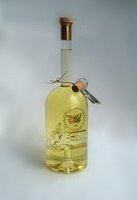 Grape brandy (most widely known by the Italian word ‘grappa’) contains between 40% and 60% alcohol (80 to 120 proof). It is made from the distillation of pomace (the residue of grapes, stems and seeds) leftover from the wine making season.
Grape brandy (most widely known by the Italian word ‘grappa’) contains between 40% and 60% alcohol (80 to 120 proof). It is made from the distillation of pomace (the residue of grapes, stems and seeds) leftover from the wine making season.Usually served as a strong after-dinner digestive, in Bosnia it is also presented as a playful aperitif, often infused with figs, apples, peaches, quinces, herbs, honey, sour cherries and walnuts.
Rakija is a liquor similar to brandy made by distillating fermented fruits, and considered to be the national drink among some of the South Slavic peoples: including Bosnia and Herzegovina.

The most common form of rakija in Bosnia is šljivovica, a strong, colorless distilled fermented plum juice (sometimes called plum brandy in English). Originated in the Balkan Peninsula; the name derives from the word for plum, šljiva or sliva.
Travarica infuses distilled grape liqueur with carefully chosen herbs grown in rough Dalmatian countryside, and is particularly good for stomach disorders. (I had this as an aperitif, last night. It was a wonderful prelude to a meal of fish soup and grilled squid.)
 Viljamovka is a Williams pear brandy (which was lovely after dessert of yogurt gnocchi, resembling panna cotta, with strawberries).
Viljamovka is a Williams pear brandy (which was lovely after dessert of yogurt gnocchi, resembling panna cotta, with strawberries).Orahovaca is infused with walnuts, and Medovina is a mead, with lip-smaking honey tones.
If you are interested in some geographic, political and social information about Bosnia / Herzegovina, and the surrounding areas, here is some I've pulled together:
Bosnia / Herzegovina is home to three prominent religions: Islam, Eastern Orthodoxy, Catholicism. It is the one of the few cities in the world, aside from Jerusalem, which boasts a Catholic cathedral, an Orthodox church and a mosque on the same square.
Bosnia is located in South Eastern Europe, also referred to as the "Balkan Peninsula" because the area is surrounded by water on three sides: the Black, Mediterranean, Adriatic, Ionian, Aegean and Marmara seas.
The term "Balkan" comes from the mountain range in Bulgaria (from a Turkish word meaning "a chain of wooded mountains"). Perennially on the edge of great empires, its history is dominated by wars, rebellions, invasions and clashes between empires, from Roman times, to the latter-day Yugoslav wars.
This region was home to Greeks, Illyrians, Paeonians and other ancient groups. Later the Roman Empire conquered most of the region. During the Middle Ages, it became the stage for a series of wars between the Byzantine, Bulgarian and Serbian Empires. By the end of the 16th century, the Ottoman Empire became the controlling force in the region. In the past 550 years, because of the frequent Ottoman wars, it has been the least developed part of Europe.
In 1914, the First World War was sparked by the assassination of the Archduke Franz Ferdinand of Austria, in Sarajevo (Bosnia's capital). After WW2, the Soviet Union played a very important role in the Balkans. During the Cold War, most of the countries in the area were ruled by Soviet-supported communist governments.
However, despite being under communist rule, in 1948 Yugoslavia fell out with the Soviet Union. Led by marshal Josip Broz Tito (1892–1980) it sought closer relations with the West.
In the 1990's, the region was gravely affected by armed conflict in the former Yugoslav republics, resulting in intervention by NATO forces in Bosnia and Herzegovina, Kosovo and the Republic of Macedonia. The status of Kosovo and ethnic Albanians is still mostly unresolved.
The countries in South Eastern Europe have friendly relations with the US and have expressed a desire to join the European Union. Slovenia and Cyprus joined in 2004. Bulgaria and Romania will become members in 2007. In 2005, negotiations began with Croatia and Turkey and Macedonia. As of 2004, Bulgaria, Romania and Slovenia are also members of NATO.





3 comments:
Orahovaca - just had some in Sarajevo - homemade and store bought. Both were excellent, the homemade was out of this world. I wonder if this coudl be purchased at all in the U.S. And is it considered port wine, liquor, or something else?
Post a Comment